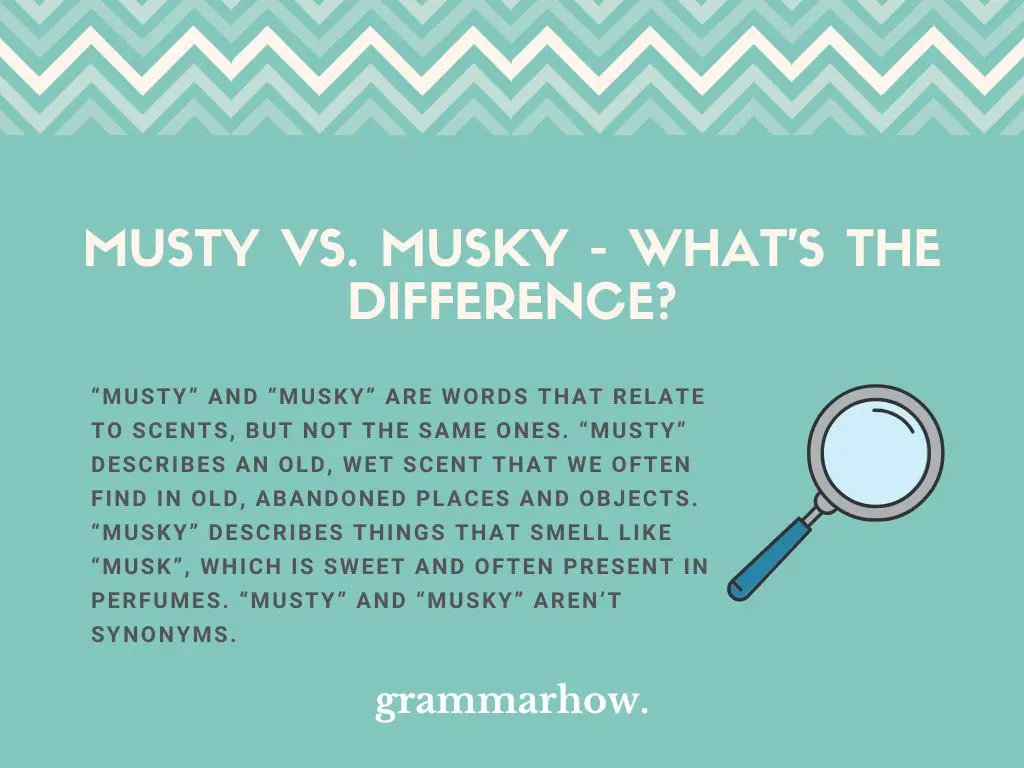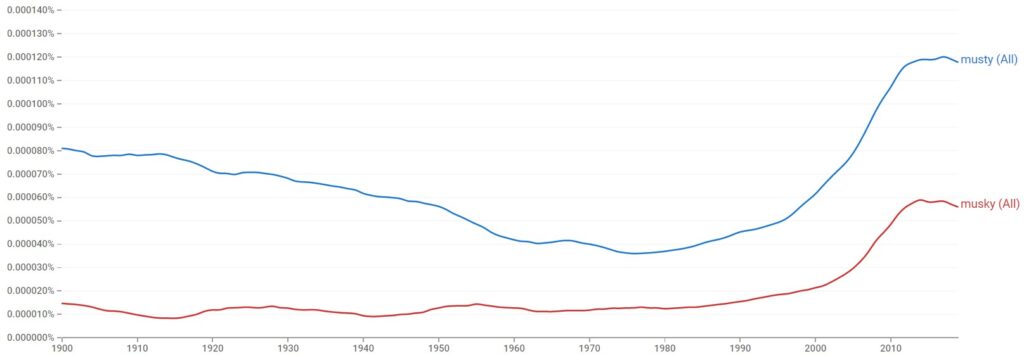Have you ever heard the words “Musty” and “Musky”, and wondered if they were the same or not? Those words are fairly similar, and the question is valid.
We want to know what’s the difference between “Musty” and “Musky”. We also want to know what each word means.
Musty vs. Musky – What’s the Difference?
“Musty” and “Musky” are words that relate to scents, but not the same ones. “Musty” describes an old, wet scent that we often find in old, abandoned places and objects. “Musky” describes things that smell like “Musk”, which is sweet and often present in perfumes. “Musty” and “Musky” aren’t synonyms.

Explanation
- There is a musty smell in the room.
- There is a musky smell in the room.
- James wears a musky perfume.
- James wears a musty perfume.
The examples show that, although “Musty” and “Musky” aren’t synonyms, they can interchange. When you replace “Musty” for “Musky” in a sentence (or vice versa) it continues to be grammatically correct.
The problem is that it changes the message the sentence conveys because those two words have different meanings.
Look at the first set of sentences. Both sentences are grammatically fine. However, the first sentence describes a room that smells old, while the other describes a room that smells sweet, like musk.
The second set of sentences also uses “Musty” and “Musky”. However, we’re describing an individual, who likes to wear a particular perfume. If you say James smell “Musky”, you mean he smells good and sweet.
On the other hand, if you say James smells “Musty”, you’re saying he smells bad and that may be offensive. Considering that people usually want to be nice to each other, it’s important to think about those differences before using “Musky” or “Musty”.
Musty
“Musty” is a valid word in the English language. You can use it if it fits the meaning of the sentence you’re constructing. ”Musty” describes things that smell old and bad.
According to The Cambridge Dictionary, something “Musty” is an adjective that describes something that is “smelling unpleasantly old and slightly wet”.
Take a look at the examples below, that will help us understand what “Musty” is:
- Why does it smell so musty here?
- After it rained, the city always smelled musty.
- Charlie loves that old musty blanket.
- Theo, that shirt smells musty. Go change right away.
- The excess humidity in the room caused it to smell musty.
Musky
“Musky” is an adjective in the English language that describes something that smells like “Musk”. “Musk” is a substance that has a strong sweet smell, which is commonly used in making perfumes. When something smells like “Musk” we describe it as “Musky”.
In The Cambridge Dictionary, we find a definition that agrees with the one we wrote above.
Take a look at some helpful examples below:
- The kitchen smelled sweet and musky because of all the baked goods.
- Frankie loves wearing musky perfume.
- Some people don’t enjoy musky scents.
- Fruit tends to be ripe if it smells sweet and musky.
- His shirts always smelled musky.
Which Is Used the Most?
Which one of those forms is used more often, “Musty” or “Musky”? Take a look at the graph from Google Ngram Viewer below.

“Musty” and “Musky” are words that, despite having different meanings, have walked hand in hand. The graph shows that when one word grows in usage, the other follows, and vice versa.
“Musty” has always been the most used form, and it appears as the preferred word throughout the timeframe covered by the graph. We think it makes sense, considering that anywhere and any time people will talk about old things.
“Musky” has always been second, although the graph indicates it’s always been a relevant word. We expected that would be the case because not all people are interested in perfumes. Even when they wear them, they might not know the names of the scents, etc.
Final Thoughts
“Musty” and “Musky” aren’t synonyms, but are both correct and acceptable. “Musty” is the scent of old, wet things. “Musky” is the sweet scent of “Musk”, which is used often in perfumes. The similarity is that those words relate to scents. However, they indicate very different scents.

Martin holds a Master’s degree in Finance and International Business. He has six years of experience in professional communication with clients, executives, and colleagues. Furthermore, he has teaching experience from Aarhus University. Martin has been featured as an expert in communication and teaching on Forbes and Shopify. Read more about Martin here.
